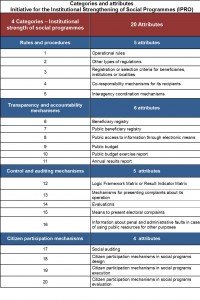- ¿QUIÉNES SOMOS?
- Programas
- Programa de Diagnóstico, Medición y Evaluación de Impacto
- Unidad de Monitoreo de Procesos
- Programa de Convenciones y Mecanismos Internacionales Anticorrupción
- Programa Sectorial en Educación y Rendición de Cuentas
- Programa de Integridad en el Financiamiento Climático (CFIP)
- Programa Editorial
- Iniciativa para el Fortalecimiento de la Institucionalidad de los Programas Sociales (IPRO)
- Programa de Investigación sobre Ciudadanía y Mercados
- BIBLIOTECA
- Comunicados de Prensa
- RENDICIÓN DE CUENTAS
- CONTACTO
A new scandal and an old story about social programmes in Mexico
In recent weeks, Mexico has experienced a new scandal about the use of anti-poverty programmes (commonly known as social programmes) to buy votes for the upcoming local elections in the state of Veracruz. On July 7th, other 13 states besides Veracruz will have local elections.
However, the way to tackle the use and abuse of social programmes for other purposes is an old story. Since 2001, the authorities have tried to “armour plate” anti-poverty programmes in order to protect them from electoral purposes. Some of the “armour plate” strategies have been the suspension of propaganda related to accomplishments from the government; the withdrawal of official vehicles 48 hours before the elections; to advance the payments or social benefits 40 days before the elections, etc. Nevertheless, “armour plate” strategies have not worked, as seen recently.
After the Presidential elections of 2006, Transparencia Mexicana (TM), the National Chapter of Transparency International, proposed that the focus should be transformed into a new one. The basic question that TM considered for the new strategy was: If Mexico does not know how many social programmes operate in the country and which are their characteristics, how could they be protected from electoral and political abuse?
In this context, TM and the United Nations Development Programme (UNDP) in Mexico created in 2008 the Initiative for the Institutional Strengthening of Social Programmes in Mexico (IPRO). IPRO is a public, neutral and independent web-based system that obtains information about social programmes and contributes to the institutional strengthening of social policy (www.programassociales.org.mx). TM and UNDP joined efforts to create a national database about social programmes with the decentralised participation of federal and state governments through Information and Communication Technology (ICT).
To establish a foundation of information, TM and UNDP Mexico applied a dynamic methodology based on a web survey that social programmes operators from local and federal governments voluntarily complete and upload in real time onto the web-based platform. The platform obtains information to create a database and to measure different dimensions of social policies and programmes. This instrument maps four categories of institutional strengthen of social programmes through 20 attributes. These attributes were defined by a group of experts in social policy in Mexico. The categories are: Rules and procedures; transparency and accountability mechanisms; financial control mechanisms; and, citizen participation mechanisms.
The 20 attributes measured are (Click the image to make it bigger):
If the social programme reports to have an attribute, the government representative has to prove its existence by uploading documentation or a link that supports the affirmative answer.
Social programmes and their institutional strength: the results
Since 2009, IPRO has obtained information of 2,050 social programmes nationally, 84 of federal agencies and 1936 of states through ICT tools. Some of the results for the 1,548 social programmes that operated during 2012 were shocking:
In a country with one of the most advanced access to information laws, one out of two social programmes registered that they make their budget (55.6%) and expenditures (51.2%) report public and available to the citizens.
Furthermore, only half of the social programmes analysed (47%) have any kind of independent evaluation.
On average, only 36% of social programmes in Mexico include social participation of any kind. For example, regarding social audit, only 38.1% of these programmes have this attribute. The differences are bigger if we focus on federal and state programmes; 83.3% of the first ones have social audit in comparison with 35.9% of the second ones.
Citizen participation in the formulation of social programmes only occurs in one out of three (33.3%) of them. Federal social programmes include it in 54.2% of them, in comparison with 32.2% at the state level.
Regarding citizen participation in the execution of social programmes, less than half of them (41.9%) have it. At the federal level, three out of four (75%) social programmes include beneficiaries during this phase. At the state level, four out of ten (40.2%).
Finally, social participation in the evaluation happens in one out of three (31.1%) social programmes nationally. At the federal level, half of social programmes include it (50%) and one out of three (30.2) of them at the state level.
Wrapping up, there are thousands of social programmes nationally that have not been mapped yet, plenty of them have weaknesses in transparency, accountability and citizen participation, as IPRO shows. With this scenario, the chances of political and electoral abuse are quite high and the “armour plate” strategy will continue not working.
The goal to be reached is well defined: to have a stronger institutional framework for social policy to be effective and protected. Change can be catalysed in all of the social programmes of the country by having standardised, comparable and real time information through ICT. This will make social programmes more transparent, accountable and participatory. This is the only way in which policial or electoral abuse could be diminished. Is this time for a new story?
Paola Palacios
Coordinator of the Initiative for the Institutional Strengthening of Social Programmes in Mexico (IPRO) @IPROMx at Transparencia Mexicana @IntegridadMx






